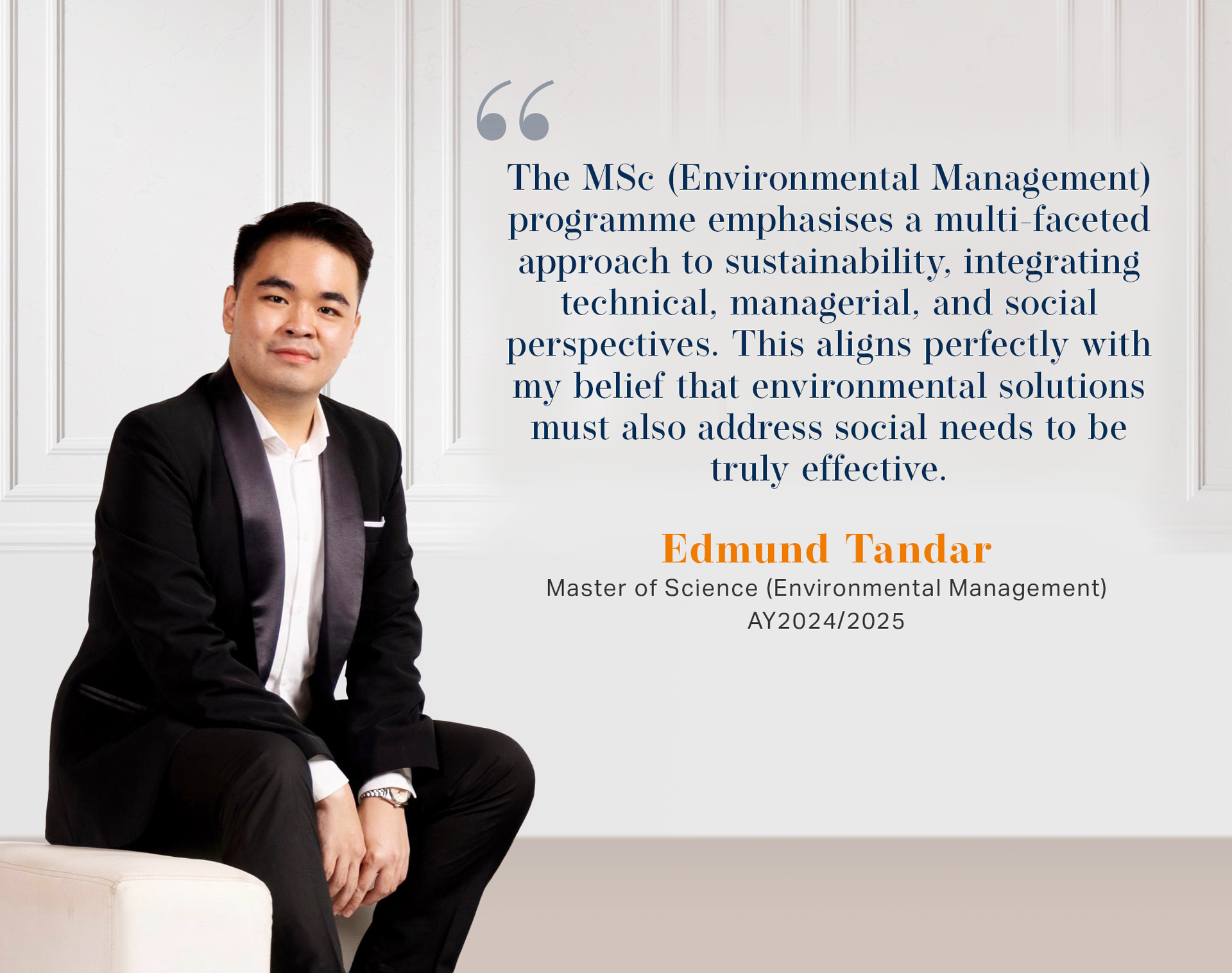
News & Stories
Latest News & Stories
For Edmund Tandar, the path to environmental sustainability demands more than just technical solutions, it requires visionary leadership and strategic management. A sustainability and strategy specialist as well as a climate-tech advocate, Edmund has taken on a range of roles across different countries, from providing environmental consultations in Canada to conducting environmental assessments and designing effluent treatment systems for the palm oil industry in Indonesia.
Given his broad exposure and professional experience, it is perhaps not surprising that Edmund was drawn to the Master of Science (Environmental Management) (MEM) programme at the National University of Singapore (NUS). The multidisciplinary and interdisciplinary nature of the programme appealed to him, and allowed him to bridge the gap between technical know-how and strategic oversight, providing him with the skills and resources he needed to drive meaningful environmental change.
Building Expertise: Gaining a Global Perspective on Environmental Challenges
Even before joining the MEM programme, Edmund’s wide-ranging professional experiences had helped him gain a more holistic perspective of environmental issues.
These experiences sharpened Edmund’s technical expertise and reinforced his belief that real progress towards resolving the environmental challenges of our time depends on integrating sustainability into industrial processes — which in turn fuelled his desire to drive change at a strategic level.
A Strategic Shift: Moving from Solutions to Leadership
Although his career had helped him develop extensive technical expertise, Edmund came to believe that he needed to be able to do more than just solve immediate environmental problems.
“During my undergraduate studies and early career, I encountered numerous environmental challenges and learned the technical solutions to address them,” he explained. “However, I soon realised that technical solutions alone are insufficient — effective environmental management also requires strategic oversight and leadership from the top levels of organisations.”
According to Edmund, the MEM programme offered him exactly what he was looking for — a curriculum combining technical knowledge with management principles, which would empower him to help organisations control emissions, implement sustainable practices, and be at the forefront of the global sustainability movement.
The MEM Experience: Hands-On Learning that Bridges Theory and Practice
Edmund’s favourite courses in the programme were ’Sustainability Strategy’ and ’Business & Sustainable Development’, courses that were instrumental in reshaping his understanding of how sustainability and business strategies are deeply interconnected.

He also praised the programme’s hands-on teaching methods, including group projects and impact activities, which allowed students to immediately apply their theoretical knowledge to real-world situations. One memorable project involved soap recycling, where Edmund’s team managed to recycle around 200 bars of soap, each sufficient for a child to use for a month. This practical aspect of the programme combined the sustainable education component, making classes both engaging and impactful, benefiting the community while enriching the learning experience.
Capstone Project with the NEA: Solving Real-World Challenges
One of the highlights of Edmund’s academic journey was his capstone project with the National Environment Agency (NEA). Designed as a practical, hands-on experience, the programme’s capstone project allows students to apply their knowledge to real-world sustainability challenges, working in teams to develop impactful solutions. Edmund’s project focused on examining the impact of weather patterns on dengue incidences in Singapore.
Edmund and his team developed a model that linked weather patterns with mosquito density and dengue cases, helping to determine the influence of various weather factors on mosquito ecology and dengue outbreaks. The project involved a steep learning curve, particularly as the software used was new to Edmund and some of his teammates.
Despite these challenges, Edmund found the experience to be highly rewarding, as the capstone project enhanced his technical skills and provided his team with valuable insights into the complex relationships that exist between environmental conditions and public health.
Paving the Way: Driving Sustainable Change
Looking ahead, Edmund is eager to contribute to sustainability initiatives — whether within a leading organisation in sustainable development, or by venturing out and starting his own sustainability-focused business. His commitment to bringing positive environmental change, particularly in his home country of Indonesia, reflects his desire to address both local and global environmental challenges.
“In the next five years, I see myself deeply involved in the field of sustainability,” Edmund shared. “I plan to leverage the knowledge, skills, and connections I have gained from NUS to drive meaningful change. As an Indonesian, I am particularly passionate about promoting sustainable practices in my home country.”
Inspired by Edmund’s story and his commitment to leading change? Learn about the MEM programme here.
Videos

